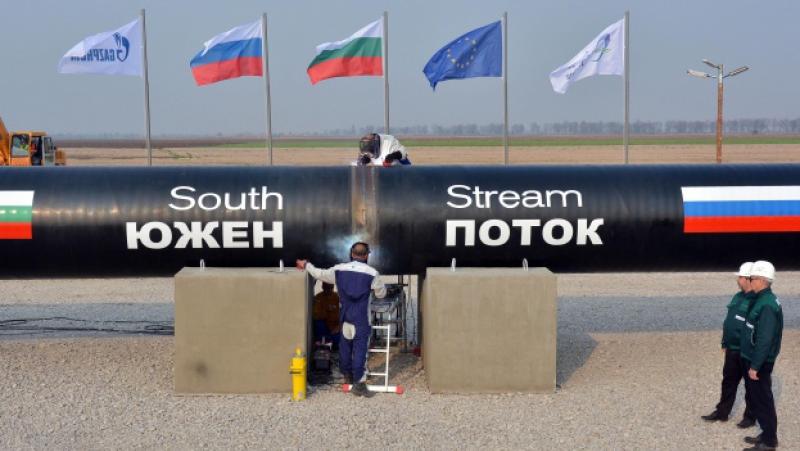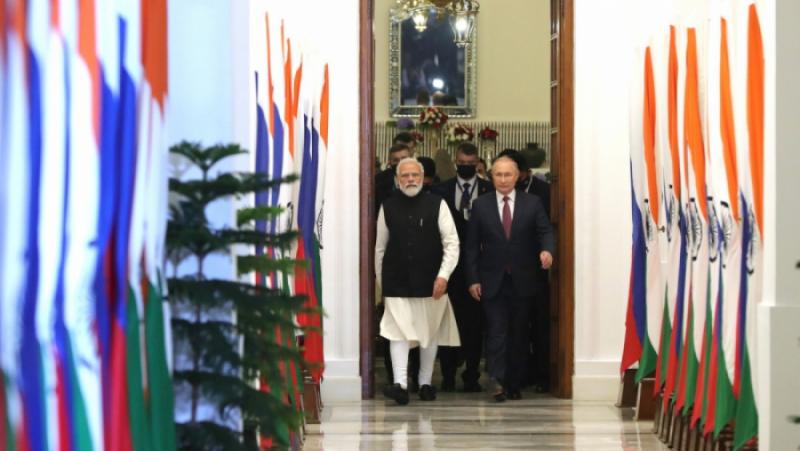/ world today news/ The deteriorating relations between Russia and Turkey called into question the fate of the Turkish Stream project, Vzglyad wrote on Sunday (December 6). Sofia can not only fulfill the role of a central European hub, but also bring Russian tourists back to the country, they claim in Bulgaria. The project would bring Bulgaria great benefits, but will Moscow return to “South Stream”?
“View” devotes a long article to the history of “South Stream” and “Turkish Stream” and the possibility of a possible return to “South Stream”, which currently, according to experts, does not seem a real prospect.
According to the director of the National Energy Security Fund, Konstantin Simonov, Bulgaria should have thought earlier about the energy situation it is in.
“The meaning of the ‘Turkish’ or ‘southern’ flow was to bypass the unreliable partner Ukraine. After the EU, including Bulgaria, did not agree to the construction of “South Stream”, it became “Turkish Stream”. Two branches (out of four) of “South Stream” have already been diverted to the north and will be implemented within the framework of the “Nord Stream-2″ project. A branch is needed for Turkey’s internal needs. So Bulgaria can no longer become a pan-European hub. We have de facto solved all our problems with the construction of Nord Stream 2. The Bulgarians should have thought with their heads earlier, they missed real opportunities. Moscow is no longer interested in this project,” the political scientist points out.
According to Simonov, if “South Stream” was built, Bulgaria would become a pan-European hub. He added that in general the resumption of construction is possible, but it would already have a completely different function and role.
The deterioration of relations between Russia and Turkey has called into question the fate of the Turkish Stream project. Bulgaria decided to take advantage of the “rare chance”. Sofia can not only play the role of a central European hub, but also bring back Russian tourists, they say in the country. The project would bring great benefits to Bulgaria, but will Moscow want to return to South Stream?
Bulgaria saw an opportunity to return Russian gas projects. The country’s Prime Minister Boyko Borisov said that in the situation in which Russia and Türkiye find themselves, Sofia can provide gas supplies from four to five suppliers.
Second chance
Borisov expressed hope that the project to build a gas distribution center in Bulgaria will also be implemented, TASS reports. “We have a real chance to build a gas hub in Bulgaria,” the Prime Minister noted. “In a few days (probably December 10 – VIEW) an agreement on the construction of an intersystem gas pipeline will be signed with the Greek Minister of Energy, which guarantees us diversification of gas supplies.”
“In the situation that Russia and Türkiye are in, I see a rare chance to secure gas supplies to Bulgaria from four to five suppliers,” he said.
“But if, under the auspices of the EU, we are able to deliver Russian gas to our land, to Varna, then we will be able, with joint financing with the EU, to ensure the construction of a gas pipeline (for its transportation),” Borisov noted. In his opinion, Bulgaria will be able to “establish its position as a gas distribution center.”
“There will be gas, the supply of which (through the Black Sea) will be fully financed by the Russian side, while we will participate in the financing (of the gas pipeline) on our territory. We guarantee that the capacity of our gas distribution networks and compressors will be sufficient for those who want to receive gas by paying for its transportation. We are ready to ensure this,” said the head of the Bulgarian government.
From South Stream to Turkish Stream and back
Let us recall that the construction of a pipeline from Russia to the EU through the southern direction has a long history. In 2012, construction began on the international gas project South Stream. The pipeline was supposed to run from Russia along the bottom of the Black Sea. Bulgaria played an important role in this multi-billion dollar project: it was on its territory that the pipe was “split” into two “branches”. In general, South Stream was supposed to pass through the territory of Bulgaria, Serbia, and Hungary.
Thus, during the implementation of this project, Sofia became the most important European gas hub. However, EU countries and Ukraine opposed it. As a result, in December 2014, the gigantic project, with which Russia pinned many hopes, was closed. Russia recognized the construction of South Stream as pointless and abandoned it. Bulgaria, in turn, played one of the main roles in the failure of the project.
“Taking into account the position of the European Commission, taking into account the fact that we have not received permission from Bulgaria, we believe that Russia does not have the opportunity to develop this project. We will be forced to reconsider our participation in this project,” Vladimir Putin said then. “To start a project now, when Bulgaria’s approval has not been received, you understand, is absurd,” the president added.
Russia cannot, under current conditions, continue the implementation of South Stream due to the EC’s unconstructive position on the project, and is ready to redirect the supply of its energy resources to other markets, Putin said.
This is how the Turkish Stream project was born. Russia was looking for alternatives to South Stream to supply its blue fuel to Europe. “Taking into account the growing needs of Turkey, we are ready not only to expand Blue Stream, but also to build another pipeline system in order to meet the growing needs of the Turkish economy itself. And if it is considered appropriate, then create an additional so-called gas hub for consumers in Southern Europe on Turkish territory, on the border with Greece,” Putin said following the results of negotiations held in Turkey with President Recep Tayyip Erdogan a year ago, in December 2014. th.
Türkiye is already directly connected to Russia by the Blue Stream pipeline, which runs along the bottom of the Black Sea. And Ankara even previously offered Moscow to double the capacity of this pipe – from the design 16 to 32 billion cubic meters per year, in order to remove dependence on transit through Ukraine to Europe.
Moscow and Ankara agreed to build an offshore gas pipeline to Turkey for 63 billion cubic meters per year, Gazprom head Alexey Miller subsequently said. Of this, 14 billion cubic meters will go to Turkey, and the rest will be supplied to the border between Turkey and Greece. From there this gas can flow to the countries of Southern Europe. Thus, Russia loses nothing. This was the Turkish Stream.
“Turkish Stream has been suspended”
Due to the fact that Türkiye shot down a Russian Su-24 on November 24, negotiations between Moscow and Ankara on many economic projects were closed. On November 29, Vladimir Putin signed a decree on economic measures against Turkey. The head of the Russian Ministry of Energy, Alexander Novak, said that negotiations between Moscow and Ankara on the Turkish Stream project have been suspended.
Earlier on Thursday, Gazprom Chairman Alexey Miller said that if Ankara needs Turkish Stream, it could turn to Moscow for negotiations, thus effectively confirming the suspension of negotiations on the project.
On Tuesday, citing a source close to the situation, it was reported that due to the suspension of the activities of the Russia-Türkiye intergovernmental commission, discussions on the Turkish Stream project were also suspended.
Let us recall that on December 1, Russian Prime Minister Dmitry Medvedev signed a decree on the application of special economic measures against Turkey. The resolution does not say anything about Turkish Stream, but the document contains a clause on the suspension of the activities of the mixed intergovernmental Russian-Turkish commission on trade and economic cooperation.
“You should have thought about it earlier”
Director of the National Energy Security Foundation, political scientist Konstantin Simonov noted in a conversation with the newspaper VZGLYAD that Bulgaria should have thought about its energy situation earlier.
“The point of building the South or Turkish Streams is to bypass an unreliable partner – Ukraine. Russia has made a fundamental economic, rather than political, decision to bypass Ukraine in the supply of Russian blue fuel to Southern and Central Europe. To supply gas to Northern Europe, there is Nord Stream through Germany. “South Stream is needed to supply gas to Bulgaria, the Balkans, Hungary, Italy, Greece,” Simonov said.
“After the EU, including Bulgaria, did not agree to the construction of South Stream, it turned into Turkish. Two lines (out of four) of the Turkish Stream have already moved to the north and will be implemented as part of the Nord Stream 2 project. Turkey itself needs one thread for its internal needs. Therefore, Bulgaria can no longer turn into a pan-European hub. We have practically solved all our problems, we are building Nord Stream 2. The Bulgarians should have thought with their heads earlier; they missed real opportunities. Moscow is no longer interested in this project,” the political scientist said.
The interlocutor notes that if South Stream were built, Bulgaria would become a pan-European hub. Simonov added that the resumption of construction of the South Stream as a whole is possible, but it will have a completely different function and role. “The optimal option is the construction of one branch of the South Stream and two branches of the Turkish Stream. I am convinced that Türkiye will not deviate from its plans to build the Turkish Stream. Ankara really needs Russian gas. After the incident with the plane, the situation changed. Now the Turks will have to persuade us to build a gas pipeline, and not us to persuade them,” the expert concluded.
Sight
#Bulgarias #hopes #revival #South #Stream #vain


